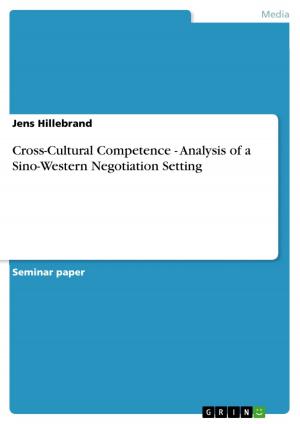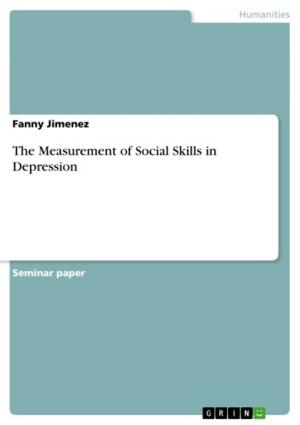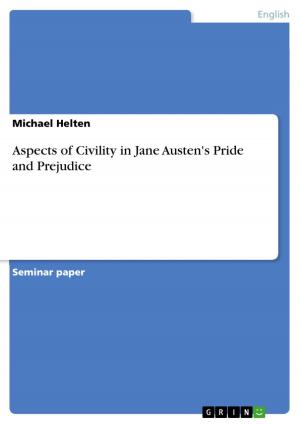Words and phrases that are to do with sex in literary and spoken English - Responses to offending language from the eighteenth and nineteenth century
Responses to offending language from the eighteenth and nineteenth century
Nonfiction, Entertainment, Drama, Anthologies| Author: | Thomas Eger | ISBN: | 9783638510288 |
| Publisher: | GRIN Publishing | Publication: | June 15, 2006 |
| Imprint: | GRIN Publishing | Language: | English |
| Author: | Thomas Eger |
| ISBN: | 9783638510288 |
| Publisher: | GRIN Publishing |
| Publication: | June 15, 2006 |
| Imprint: | GRIN Publishing |
| Language: | English |
Seminar paper from the year 2001 in the subject English Language and Literature Studies - Linguistics, grade: 1,0, Bielefeld University, 12 entries in the bibliography, language: English, abstract: In his book 'Dr. Bowdler's Legacy' Noel Perrin tells us in the first chapter that a big change of morality took place with the turn of the nineteenth century in England. He puts it as follows: '... the first new generation of the nineteenth century (grew) up more strait-laced, inhibited, and conventional than its parents, so that sons discussed their fathers' wild oaths, and daughters worried about their mothers' loose sexual behaviour.' According to Perrin one of the cornerstones of this new way of thinking was that the people began to acquire a more reserved attitude towards sexuality. The chief cause of this tendency was what can be called the rise of the idea of delicacy, or 'the new prudery'. From the middle of the eighteenth century onwards, delicacy came to be regarded as a special and precious characteristic - especially among women. Basically, it means that people felt offended as soon as they were confronted with sexuality in whatever form. Blushing and fainting were outward indicators of this new propriety. Another consequence was that people began to keep away from anything that might be a burden on their conscience. An important result of this trend was the emergence of the idea of expurgation in literature. That is people simply started to remove 'words or scenes that were considered likely to offend or shock'. The pioneering work in this field was Dr. Bowdler's 'Family Shakespeare', which was published in 1807. Dr. Bowdler's aim was - according to the fashion of his time - 'to exclude from this publication whatever is unfit to be read aloud by a gentleman to a company of ladies'. In another passage he says that he wants to enable a father to read one of Shakespeare's plays to his family circle 'without incurring the danger of falling unawares among words and expressions which are of such a nature as to raise a blush on the cheek of modesty ...'. As he says in the preface to the first edition, Bowdler was primarily concerned with profanity and obscenity. In this essay I will constrict myself to the field of obscenity in its sexual dimension. In the first part of my paper I will watch a Victorian at work by examining Bowdler's version of 'Romeo and Juliet' and comparing it to Shakespeare's. What kind of words and passages does he change and in what way does he revise them? Does he treat different terms in different ways?
Seminar paper from the year 2001 in the subject English Language and Literature Studies - Linguistics, grade: 1,0, Bielefeld University, 12 entries in the bibliography, language: English, abstract: In his book 'Dr. Bowdler's Legacy' Noel Perrin tells us in the first chapter that a big change of morality took place with the turn of the nineteenth century in England. He puts it as follows: '... the first new generation of the nineteenth century (grew) up more strait-laced, inhibited, and conventional than its parents, so that sons discussed their fathers' wild oaths, and daughters worried about their mothers' loose sexual behaviour.' According to Perrin one of the cornerstones of this new way of thinking was that the people began to acquire a more reserved attitude towards sexuality. The chief cause of this tendency was what can be called the rise of the idea of delicacy, or 'the new prudery'. From the middle of the eighteenth century onwards, delicacy came to be regarded as a special and precious characteristic - especially among women. Basically, it means that people felt offended as soon as they were confronted with sexuality in whatever form. Blushing and fainting were outward indicators of this new propriety. Another consequence was that people began to keep away from anything that might be a burden on their conscience. An important result of this trend was the emergence of the idea of expurgation in literature. That is people simply started to remove 'words or scenes that were considered likely to offend or shock'. The pioneering work in this field was Dr. Bowdler's 'Family Shakespeare', which was published in 1807. Dr. Bowdler's aim was - according to the fashion of his time - 'to exclude from this publication whatever is unfit to be read aloud by a gentleman to a company of ladies'. In another passage he says that he wants to enable a father to read one of Shakespeare's plays to his family circle 'without incurring the danger of falling unawares among words and expressions which are of such a nature as to raise a blush on the cheek of modesty ...'. As he says in the preface to the first edition, Bowdler was primarily concerned with profanity and obscenity. In this essay I will constrict myself to the field of obscenity in its sexual dimension. In the first part of my paper I will watch a Victorian at work by examining Bowdler's version of 'Romeo and Juliet' and comparing it to Shakespeare's. What kind of words and passages does he change and in what way does he revise them? Does he treat different terms in different ways?















